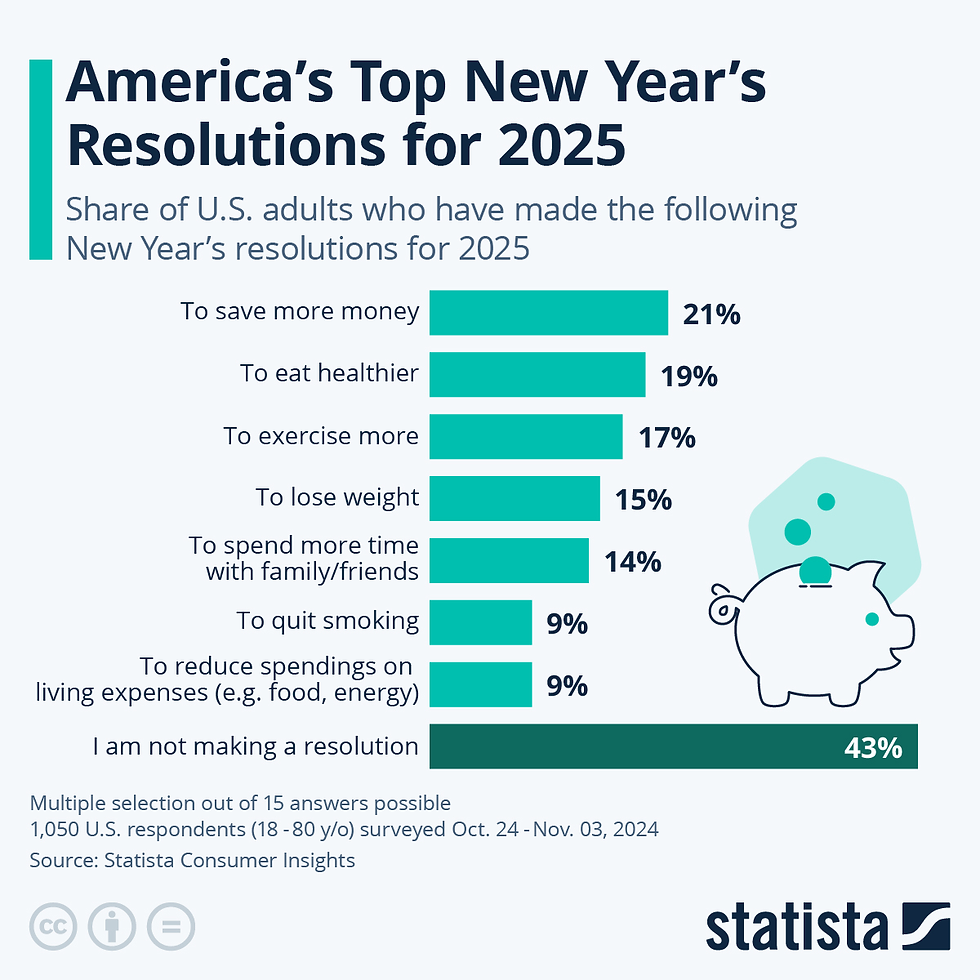
New Year, New You: Psychology Behind New Year’s Resolutions
- carolinecannon20080
- Dec 31, 2024
- 3 min read
New Year, New You: Psychology Behind New Year’s Resolutions
Every year, people work to improve their mental and physical health. One way many people start these life improvements is through new year’s resolutions. Many people start new diets, fitness journeys, and overall ways to improve mood and well-being. Read this blog to learn about the psychology behind new year’s resolutions!
What is a New Year’s Resolution?
A new year’s resolution is a goal one has set for the year to come. The goal is to stick to the resolution for the whole year and keep it part of a daily routine or lifestyle. Most new year’s resolutions are made to improve life and create healthy habits. The most common new year’s resolutions tend to be eating healthier, saving money, increase exercise, spend time with family/friends, and quit bad habits such as smoking or drinking.

Why do People Create New Year’s Resolutions?
People create new year’s resolutions because it gives the feeling of a new beginning and a fresh start. Many people have the desire to improve lifestyles for their benefit, but a study done shows that roughly 60% of people who make new year’s resolutions feel pressured into it. A study done by Forbes Health shows that in America, 45% of men and 50% of women surveyed want to exercise more in 2025. Of men surveyed, 30% wish to save more money, 25% wish to improve their diet, 20% wish to work on their career, and 18% wish to travel more. Of women surveyed, 40% wish to lose weight, 28% wish to save more money, 22% wish to spend more time with family, and 20% wish to improve their mental health.
Psychology Behind New Year’s Resolutions
There are many mental factors behind creating new year’s resolutions. These mental factors include of wanting a fresh start, having purpose/motivation, and increased levels of dopamine.
· Having a fresh start- A fresh start to a new year offers a unique opportunity to leave behind the challenges and setbacks of the past and create a journey of growth.
· Purpose and Motivation- Having goals can give us purpose and reason to improve our lives as individuals. Being motivated is one of the main driving forces of why people have a desire for personal growth and improvement.
· Release of dopamine- Setting goals triggers the release of dopamine, commonly known as the feel-good chemical. Dopamine helps to manage pleasure and reward centers in the brain while regulating emotional responses. Completing and fulfilling the goals set will also cause dopamine to be released, making us happy and proud of the accomplishments.
Why do People Quit Resolutions?
There are many reasons why new year’s resolutions tend to fail, and it isn’t because we are failures, we just don’t have the right mindsets and processes about forming a resolution. The 3 main reasons new year’s resolutions fail include of:
· Thinking too big- Many resolutions often revolve around huge changes like adjusting our eating habits or getting more sleep, but the truth is, it is very difficult for humans to switch up a lifestyle overnight. The best way to approach a new year’s resolution is by easing ourselves into the change, instead of making an overwhelming change that we probably can’t sustain mentally or physically.
· Why? - When making new year’s resolutions, we focus on what we should do and not focusing on how it benefits us. One way we're more likely to change is to understand how the changes will positively impact us and truly want a change.
· We aren’t ready, mentally or physically- There are 5 main stages to creating a change while also preparing the body for the upcoming change. The stages are (1) Pre-contemplation: starting to become aware that there may be something to change. (2) contemplation: thinking about making a change. (3) Preparation: start putting a plan together to make a change. (4) Action: make the change. (5) Maintenance: determine how to maintain the change. We can’t fully complete these steps overnight; time and preparation are needed in order to have a successful year.
Statistics from Coolest Gadgets shows that 9% of people give up their resolution within a month or less. 57% of people give up their resolutions after 2-4 months, 16% of people give up their resolutions after 5-7 months, 8% of people gave up their resolutions after 8-12 months. Only 6% of the population sticks with their new year’s resolution for the whole year.

Sources:
Culqui, Eric. “The Psychology behind New Year’s Resolutions.” PAR, Inc. Psychological Assessment Resources since 1978, 17 July 2024, https://www.parinc.com/learning-center/par-blog/detail/blog/2024/01/02/the-psychology-behind-new-years-resolutions
Vinney, Cynthia. “The Psychology behind Why New Year’s Resolutions Fail.” Edited by Sabrina Romanoff, Verywell Mind, Verywell Mind, 2 Jan. 2024, https://www.verywellmind.com/why-new-years-resolutions-fail-6823972
Pawar, Pramod. “New Year’s Resolution Statistics by Demographics, Region and Gender.” Edited by Rohan Jambhale, Coolest Gadgets, 7 Nov. 2024 https://www.coolest-gadgets.com/new-years-resolution-statistics/#:~:text=New%20Year's%20Resolution%20Statistics%20show%20that%2C%20on%20average%2C%20resolutions%20last,are%20still%20sticking%20to%20them




Comments